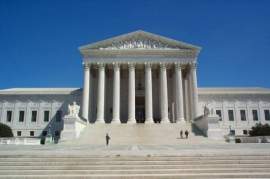
History Bill Of Rights

Popular In Constitution
Purpose Of Lifetime Appointment And Pros And Cons Enumerated Powers Bicameral Legislature Background Article 3 Of The Constitution We The People 1st Amendment Who Wrote The Constitution Judicial Review Equal Protection Clause 5th Amendment 10th Amendment Three Fifths Compromise
The United States Bill of Rights, which consists the first 10 Amendments found in the Constitution, grants unequivocal civil liberties to the individual American. The Bill of Rights originated through sentiments that stood against dominating governments. The memories of a controlling government loomed large in the American consciousness. Through the levying of unfair and obscene taxes, American settlers were constantly oppressed by the autocratic British Monarchy. When the Revolutionary War was won and America gained independence from Britain, the need for an efficient Constitution became critical.
A governing doctrine was essential to fairly distribute power between the Federal Government, the State governments, and the individual American. Adopted in 1777, the Articles of Confederation was the first recognized Constitution, but failed to equally distribute power among the three entities. Although constantly ratified throughout the subsequent five years, the Articles of Confederation did not include any civil liberties for the individual American. The Federalist Party led by Alexander Hamilton was keen on adopting a Constitution that focused primarily on a sturdy Federal Government. Hamilton and other members of the Federalist Party sought to create a powerful governing body to properly function and administer taxes, laws, and policy. The original framers of the Constitution were focused on creating a healthy and powerful machine, as opposed to offering civil liberties to the individuals which encompassed the machine. The adopted Constitution was filled with irony. Americans just won independence from a country which was viewed as possessing too powerful of a government. The original Constitution included only a few specific individual liberties: laws that prohibit both Federal and State governments from punishing citizens for ex post facto violations (laws that are violated that were not considered criminal at the time), protection against states from impairing contracts, and legislative determinations of punishment for criminal actions.
Although these rights were limited, James Madison, the author of the United States Bill of Rights, felt as though the true liberties were administered through the separation of powers between Federal and State governments. Even though, the Articles of Confederation offered rights that seemed substantial to James Madison and other Anti-Federalist advocates, momentum was still gaining in regards to the adoption of undeniable individual rights. Along with the Anti-Federalist Party, the exclusion of individual rights also created a stir among the working class and poor citizens of America. Revolts such as Shay's Rebellion put pressure on State leaders to observe the voice of the people and deliberate in regards to an inclusion of individual rights in the Constitution.
When the Articles of Confederation were first adopted, State leaders and legislators would hold ratification meetings to field any ideas or suggestions to amend the framework. On September 12th, 1787, Charles Pickney, a delegate, and a leader of the Anti-Federalist Party, proposed several individual rights to the committee including: liberty of the press and a ban on accommodating soldiers in private homes. Although the proposal was rejected, the matter habitually came up and created inertia for the Anti-Federalist Party. As proposals for a United States Bill of Rights continued to be rejected, James Madison grew increasingly motivated to offer a proposal himself. During the fall of 1788, Madison let his desires be heard, as he continually raised the issue of an impending proposal. Madison believed that a United States Bill of Rights would be educational; it would be a vehicle used to rally Americans together to fight a future oppressive government and instill patriotism for a country that offered such liberties. When the first Congressional meeting took place in 1789, Virginia Congressman James Madison officially proposed a version of the United States Bill of Rights. The original proposal included twelve Amendments, some of which were immediately rejected, others of which were subsequently modified. Along with his draft of the United States Bill of Rights, Madison gave a calculated speech that answered questions posed by skeptics.
The opposing Federalist Party viewed the United States Bill of Rights as redundant, for liberties were inherent in the original Constitution. Madison, however, scoffed at this viewpoint and repeatedly stated that the rights of the individual are the driving force for a free nation. The original United States Bill of Rights was a derivative based off of individual State Constitutions. Madison constructed Virginia's Constitution, which offered numerous individual rights to its citizens. The proposal eventually gained the 3/4 necessary vote for adoption on December 12th, 1791. The Amendments were viewed as a compromise; the United States Bill of Rights offered the individual unquestioned liberties, while establishing the Federal Government as the powerful overseer to such rights.
NEXT: What Is The Importance in American Jurisprudence





















